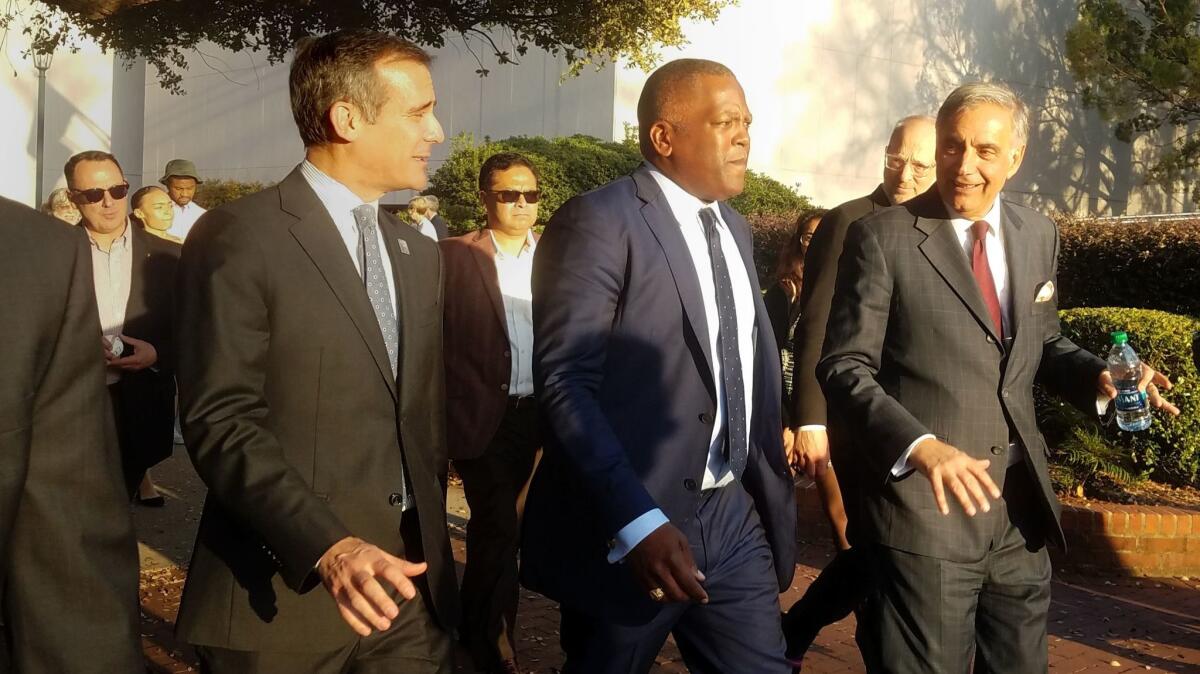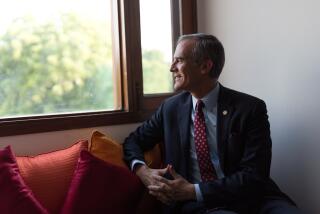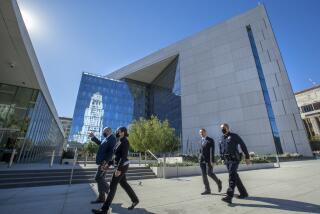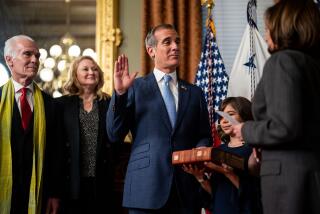This is why the mayor of Los Angeles is visiting an early presidential primary state

- Share via
Reporting from Hopkins, S.C. — Los Angeles Mayor Eric Garcetti is not well known in this rural Southern town of 2,882 residents.
So there were lots of questions when the dapper 47-year-old Democrat, who presides over a city of nearly 4 million, strolled into a local health and fitness center Wednesday evening, grinning broadly as a crowd of more than 100 seniors finished their dinner of fried chicken and mac and cheese.
“What’s his name?” whispered Patricia Randolph, 63, a retired school teacher, as she eyed the trim politician in the sleek, dark gray suit.
“I wonder what he’s doing here?” said James Lewis, 67, a rental property owner who teaches yoga at the center.
Garcetti, who is mulling a bid for the White House in 2020, was tight-lipped about his national aspirations as he traveled more than 2,000 miles from California to South Carolina, a pivotal election state that typically hosts the South’s first presidential primary.
“I’m just being mayor of L.A.,” he said with a chuckle after stepping off a bus tour of Columbia, S.C., on Wednesday with his counterpart there, Steve Benjamin.
Garcetti billed his trip to South Carolina as a meeting of Accelerator for America, a nonprofit group he set up to encourage local leaders to share successful policies to generate jobs and build infrastructure. It was also an opportunity for political networking. He attended a Democratic Party fundraiser in Columbia, spoke at a Democratic town hall meeting in Hopkins, visited Clemson University’s automotive research center and toured both Columbia and Greenville.
While the 2020 political calendar has not been set, South Carolina is expected to resume its customary place as the fourth contest in the Democratic nominating process, after the Iowa caucuses, New Hampshire primary and Nevada caucuses. Garcetti, who has been criticized in Los Angeles for frequent trips to raise money and campaign for other Democrats, has already visited New Hampshire and Nevada.
“It’s time to test the waters,” said Charles Bierbauer, a professor of journalism at the University of South Carolina and a former White House reporter for CNN. “He’s got to make connections here.”
Garcetti, a Jewish Latino who easily won reelection last year with 81% of the vote, would probably face steep odds in a presidential election.
No mayor in American history has gone directly from City Hall to the White House. (Three presidents — Andrew Johnson, Grover Cleveland and Calvin Coolidge — had been mayors, but they served as governors in between.)
And while some political observers say the 2016 election of President Trump proves anything is possible, others question whether Garcetti’s talents in presiding over one of the nation’s largest and most left-leaning cities will resonate with swing voters in purple states.
“Number one, he’s extraordinary liberal, and number two, he’s Hollywood chic,” said Richard Harpootlian, a South Carolina attorney and former chairman of the state Democratic Party, who favors Joe Biden. “Look, he’s got that Beverly Hills haircut. Folks here don’t pay $200 for a haircut!”
In Hopkins, which sits about 10 miles southeast of Columbia, Garcetti urged local Democrats to reject the idea that America was a nation divided between east and west, rural and urban, Democrat and Republican, Hillary Clinton and Bernie Sanders.
“Yes, it’s true. I come from Los Angeles, and we have a few more Kardashians than you do,” Garcetti told the crowd of mostly African American seniors. “But we are mostly nurses and firefighters and factory workers and janitors and people who have dreams and hopes and are frustrated as you are about the direction of this country.”
He repeatedly emphasized seizing control at the local, grass-roots level: “Washington is broken, but American cities are not.”
“We can’t await a savior in 2020,” he said to loud cheers. “This is not about who’s in the White House — although we need to kick that guy out who’s there. This is about the statehouse, this is about the school board, this is about mayors and the city council.”
Asked how he would tackle income inequality, Garcetti acknowledged severe challenges. Los Angeles voters, he said, had taken a major step in passing Measure M, the plan to raise sales taxes to generate $120 billion and hundreds of thousands of U.S. jobs over 40 years to fund a major overhaul of the city’s road and rail transportation.
Yet he noted that as he looked to build 15 rail lines across his city, he found there was not a single American company that builds trains.
“Today we need to put assembly lines together to build those trains and that port equipment and to build those tunnels and to fix those bridges,” he said. “That is an example of middle-class jobs that will deal with income inequality.”
It was Garcetti’s personal story of his family’s humble beginnings as immigrants — his paternal grandfather was carried across the Mexico-U.S. border as a 1-year-old and his maternal grandfather, a Jew, fled Russia in the early 20th century — that resonated with many in the crowd.
“He don’t talk like he was born with a silver spoon in his mouth. He can connect. I love it!” said Debra Finch, 66, a retired property manager, as she left the town hall. “We need somebody who has experience, and it’s the right kind of experience because it’s local and it’s grass-roots.”
Finch was not sure she would vote for Garcetti if he ran for president — Biden, she said, was so likable — but she said he was definitely an option and she was inspired by his words.
“I feel alive again,” she said. “Everything on TV is Democrats don’t have a message. But he has a message and he reminded us of who we are and what we represent. We care and we’re fine.”
“He’s real people,” said Bernice G. Scott, 73, a former Richland County councilwoman, adding that any Democrat would be better than Trump.
“When you got a real bad toothache, you don’t care if they pull it out or fix it,” she said. “We just need to stop hurting.”
More to Read
Get the L.A. Times Politics newsletter
Deeply reported insights into legislation, politics and policy from Sacramento, Washington and beyond. In your inbox twice per week.
You may occasionally receive promotional content from the Los Angeles Times.









